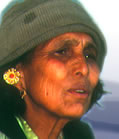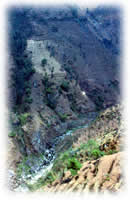 |
 |
||
 |
|||
|
RELATED THEMES agriculture development water OTHER LOCAL THEMES BACKGROUND |
environment
Many speak of the need to conserve the forest, citing its importance for fuel wood and watershed function, and yet they recognise the tension between conserving it and the need for more cultivable land. Community schemes to replant or to protect existing forest (against tree-cutting locals and wild animals) are described but, generally, lack of enforcement of conservation rules is seen as a problem. Some speak of a need for attitudinal changes, and one describes his campaign - eventually successful - to win the community's support for regeneration of the forest. A couple of narrators blame the political changes in Nepal and people's unfamiliarity with the new system: "They think in a democracy people can do anything." Another says that awareness-raising among women is particularly important since they are the main collectors of fuel. A traditional healer (Nepal 5) describes how he carefully nurtures and preserves the supply of medicinal plants. Drought occurs now and again, and the increasing unpredictability of the weather seems to be a cause of concern. One narrator says people are moving out of the area because of the problem of landslides, caused by high rainfall. But another, whose community has benefited from a watershed development project, says: "When people look at the forest cover now, they ask in disbelief, was there a landslide here?" (Nepal 22). He is one of several who talk of improved soil and water management and the dividends this has paid (see Nepal 23). Another (new) narrator says that now everyone in her community grows trees in their own fields, and no longer have to get fodder and fuel wood from the forest: "Now it is convenient, as one.need not go to the forest. Now young trees are planted in one's own field. And some collection of fodder and firewood from your own young trees, together with a little bit from the forest, amounts to quite a lot. There was no practice of planting young trees in your own field before. People.did not know how to do this" (Nepal 31). quotes about environment"Mostly, it is the women who collect fodder. While doing so, they should not cut young trees. If young trees are cut, it should be found out who did it. Besides, two or four people should come together and plant saplings on the barren hills and fields. Women cut down young trees because of the lack of awareness.. [We can take action] by providing education, by arranging seminars on environmental preservation." "I was ploughing my field, I looked for a stick to hit my ox with and I went to the other hillside but I could not even find one stick.the grass cutters cut everything so the plants didn't have the chance to grow big. Then the people used to cut the forest and grow beds of millet.. I stopped the people from [growing] millet in the jungle and asked them to keep [it] in their fields.. But still the people kept on cutting the grass and the trees along with it, so I gathered all the villagers and passed the resolution and told them that if anyone was seen cutting the grass along with the saplings they will be fined. Only then did people stop. and finally the trees could grow big. So now we have quite a dense forest everywhere." "People in the past did not plant any trees, maybe because the forests met their needs. The soil also slid down because cattle were let loose on this steep terrain. Moreover, the land was not terraced....[Our land] no longer looks like a landslide area. In the old days, in our disturbed frame of mind, we used to wonder where we could escape.... We did not arrest and check that which we could have prevented on our own; I suppose it was because of our lack of knowledge. I don't fear the landslide anymore.... I have repeatedly told others that looking to the government for terracing is not enough, we have to do it ourselves wherever there are landslides." "The jungle was destroyed continuously. There was jungle everywhere. The soil on freshly cultivated land from jungle was good but now at same place, there is just cliff everywhere. All the soil of our fields had been swept away. Only those who have enough manure can cultivate but those who have no manure can't cultivate." "We have a forest conservation committee with the advice of the forest division and there are 127 houses and families as consumers. We have a working committee of 19 members who collect Rs. 10 from each member every year. Each consumer member has to stand guard to protect the forest, so I also have to do that duty, everybody has to attend once a month. That is why our forest conservation project is successful. This programme is like giving the key to a thief, it is very good permission, so whenever the needs be, we can use the fallen trees and branches but the committee has to decide on it." "We used to chop firewood all night in the forest.walked in the darkness carrying firewood to sell at Bhadgaon.We had to be alert in case the forest guard caught us. Altogether we would be 60 to 70. I would swing my stick at the forest guard and let 60 to 70 persons escape. During those days some of us didn't have rice in our house, [and] no salt, so what else could we do but sell firewood for money?" |
|
 Narrators refer to the jungle
Narrators refer to the jungle